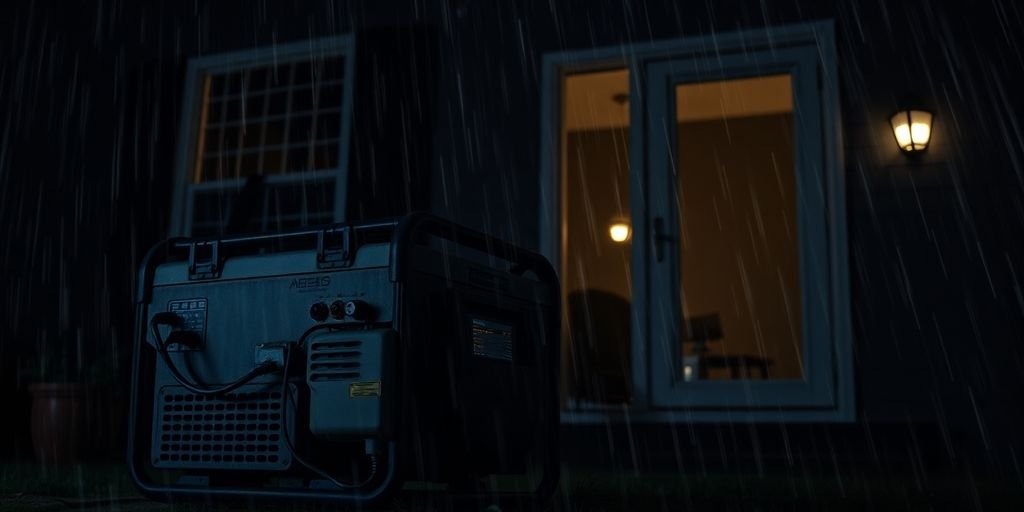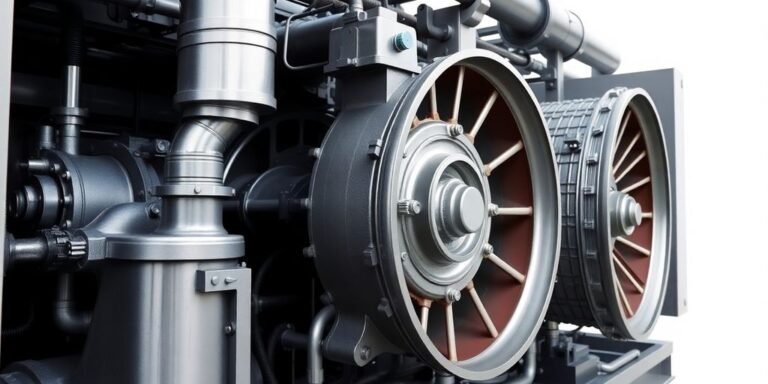The Best Home Generators I Tested Kept My Lights on Through All Kinds of Bad Weather
Living somewhere with crazy weather means you really need a good plan for when the power goes out. Sometimes, you just need to keep the fridge running for a bit during a blackout. But a big portable generator, or even a standby one that’s always hooked up, can keep your whole house going for days. Home generators are a crucial investment—getting emergency power isn’t cheap, but it’s super important. This review looks at some of the best options out there.
Key Takeaways
- The DuroMax 11,000-Watt Portable Dual Fuel Inverter Generator is a top pick for overall performance and versatility.
- For those on a tighter budget, the Generac GP9500E Tri Fuel Portable Generator offers solid power without breaking the bank.
- If you need serious power, the Predator 13,000-Watt Tri-Fuel Portable Generator is great for high-capacity needs.
- The Bluetti AC500 Power Station with B300K Expandable Battery stands out as an excellent solar-powered choice.
- For a permanent setup, the Briggs & Stratton PowerProtect 13,000-Watt Dual Fuel Standby Generator is a reliable standby option.
1. DuroMax 11,000-Watt Portable Dual Fuel Inverter Generator
The DuroMax XP11000iH is a beast. Seriously, this thing feels like it could power a small town, not just my house. It’s a dual fuel model, which means you can run it on either gasoline or propane. That’s a huge plus in my book, because you’re not stuck scrambling for gas if there’s a shortage. Plus, propane tends to burn cleaner, which is always a good thing.
The 9,000W running output is enough to keep a medium-sized home running smoothly, even with power-hungry appliances. It’s also an inverter generator, so it produces clean power that’s safe for sensitive electronics like laptops and TVs. I really appreciate that peace of mind.
DuroMax XP11000iH: A Heavy-Duty, Dual Fuel Powerhouse for Whole-Home Backup
One of the things that surprised me most about the DuroMax is how quiet it is. I mean, it’s still a generator, so it’s not silent, but it’s definitely quieter than other models I’ve tested. DuroMax encloses it in a sturdy plastic casing, which helps dampen the sound. At 61 dB on a 20 percent load, it’s about as loud as a dishwasher. Most comparably sized generators go up to around 80 dB–about the same volume as a police siren.
It’s got all the modern safety features you’d expect, like a CO2 shutoff and low oil shutoff. And it even comes with a remote control, which is super handy when you don’t want to go outside in bad weather to start it. The generator’s essential features are a big plus.
Here’s a quick rundown of the pros and cons:
- Pros:
- Inverter technology for clean power
- Dual fuel capability (gasoline or propane)
- Relatively quiet operation
- Remote start
- Cons:
- It’s heavy. Like, really heavy.
Overall, I’m really impressed with the DuroMax XP11000iH. It’s a powerful, reliable generator that’s packed with features. If you’re looking for a generator that can keep your whole house running during a power outage, this is definitely one to consider.
2. Generac GP9500E Tri Fuel Portable Generator
Generac GP9500E: A Versatile Tri-Fuel Generator That Balances Power and Price

The Generac GP9500E is a solid choice if you’re trying to balance cost and capability. It’s not the cheapest, but it gives you a lot for the money. Its 9,500W running capacity can handle most homes, though it might get a bit loud when powering everything at once. I noticed it was pretty quiet with just lights and a few appliances, but when the heat kicked on, it definitely got louder.
One of the best things about this generator is its tri-fuel capability. You can use gas, propane, or natural gas. I was skeptical about needing three options, but it came in handy during a storm when I didn’t have gas or propane. I just plugged it into my natural gas line, and I was the only one on the block with power. It’s a great feature to have for backup power.
It’s a pretty basic model, though. It has safety features like low oil and CO2 shutdown, but it doesn’t have a fancy digital display or remote start. I don’t mind that, though. Sometimes it’s better to have something simple that works. The control panel is easy to use, and it’s easy to get it up and running.
Like other generators this size, the GP9500E is heavy. It’s built sturdy, though, which makes up for it. It has wheels and handles, so you can move it around, but it’s still a beast. The outlet covers feel more durable than some other models in this price range.
Overall, the Generac GP9500E is a great option if you want a reliable tri-fuel generator without spending too much. It’s not the fanciest, but it gets the job done.
Here’s a quick rundown of the key specs:
| Spec | Value |
|---|---|
| Running Watts | 9,500W |
| Starting Watts | 12,500W |
| Outlets | 1 x 120/240V, 40 Amp; 1 x 120/240V, 30 Amp; 2 x 120V, 20 Amp |
| Engine Size | 500cc |
| Starter | Electric |
| CO Shutoff | Yes |
| Low Oil Shutoff | Yes |
| Fuel | Gasoline, Propane, Natural Gas |
| Fuel Capacity (Gas) | 7.5 gal |
| Weight | 219 lb |
| Noise Level (25% Load) | 65 dB |
3. Predator 13,000-Watt Tri-Fuel Portable Generator
Predator 13,000-Watt: High-Capacity Tri-Fuel Generator With Remote Start and Serious Power
The Predator 13,000-Watt Tri-Fuel Portable Generator is a beast. It’s about as much wattage as you can squeeze out of a portable unit before needing to consider a permanently installed standby generator. This thing has almost every feature you could want.
Its typical running output is around 10,000W, which should be plenty for most homes. The fact that it can peak at 13,000W means it can handle pretty much anything you throw at it. The noise level is around 80 decibels, which is loud, but honestly, pretty average for a generator of this size. I think that’s pretty good, considering its capacity. I did notice it got pretty loud at night when I was running the heater and a bunch of kitchen appliances. Still, it never felt like it was struggling to keep up.
Tri-fuel capability gives you a lot of flexibility. The 10.7-gallon gas tank is also bigger than average, so it’ll run longer, as long as you keep it under the standard wattage. It also has a wider range of outlets than some of the other generators I tested, with both 120/240 V and 120V outlets at 30 amps. This makes it compatible with almost any home or RV. It also has some cool features that you usually only find on bigger, more expensive generators. A remote starter lets you fire it up or shut it down from inside. Digital engine monitoring tools help you maximize its efficiency, and it even has a built-in circuit breaker.
I really appreciated the remote start feature during a particularly nasty storm. Being able to start the generator without having to go outside was a huge plus.
Here’s a quick rundown of some key specs:
- Running Watts: 9,500W
- Starting Watts: 12,500W
- Outlets: Includes multiple 120V and 240V options digital display
- Engine Size: 458cc
- Low Oil Shut-Off: Yes
- Weight: 226 lb
- Noise Level: 78.5 dB at 50% load
4. Bluetti AC500 Power Station w/ B300K Expandable Battery
I’ve been playing around with portable power stations for a few years now, and the Bluetti AC500 really stands out. It’s got the juice to keep your house running, assuming you have a way to keep it charged. Solar panels are ideal, but you can also use traditional AC charging.
What makes the AC500 cool is how much you can expand it. Out of the box, paired with a B300K battery, you’re looking at 2,764.8 watt-hours. But you can chain up to six batteries together for a total of 16,588 watt-hours. That’s enough to power a home for days. Plus, it has a built-in power inverter and USB ports for charging devices directly.
Charging can be a bit slow during an outage, but it supports up to 3,000 watts via solar or 8,000 watts combined with AC. One of the best things about power stations is how easy they are to use. Unlike some complicated home solar setups, the AC500 is basically plug-and-play. Though, for safety, you should get an electrician to install an automatic transfer switch.
One of the big advantages of a power station over a generator is an intuitive, tech-influenced design. Some home solar power setups can be very complicated, but the AC500 is effectively plug and play.
Here’s a quick rundown of some key specs:
- CO Shut-off: N/A (Electric/Solar only)
- Low Oil Shut-off: N/A (Electric/Solar only)
- Weight: 66.2 lb
- Noise Level: 48 dB
5. Briggs & Stratton PowerProtect 13,000-Watt Dual Fuel Standby Generator

If you’re looking for a reliable, permanently installed solution, the Briggs & Stratton PowerProtect 13,000-Watt Dual Fuel Standby Generator is a solid choice. It’s designed to automatically kick in during a power outage, providing seamless backup power to your home. This model runs on both propane and natural gas, offering flexibility and ensuring you’re never left in the dark.
One of the standout features is its relatively compact size compared to other standby generators with similar output. It’s about 39% smaller than comparable models, making it easier to fit into your yard without being an eyesore. Plus, the quieter operation, around 65 dB at 50% load, means it won’t disrupt your peace and quiet too much. The PowerProtect 13000 Watt Dual Fuel Standby Generator connects directly to your existing fuel lines, eliminating the need for manual refueling.
Here’s a quick rundown of what makes it a great option:
- High Power Output: With 13,000 running watts and 20,000 starting watts, it can handle most household needs.
- Compact Design: Takes up less space than many other standby generators.
- Automatic Operation: No need to manually start it during an outage.
Having a standby generator professionally installed is a significant investment, but the peace of mind it provides during severe weather is invaluable. Knowing your home will stay powered, regardless of the conditions outside, is a huge relief.
While it’s not a portable unit, the Briggs & Stratton PowerProtect offers a level of convenience and reliability that portable generators simply can’t match. It’s a worthwhile investment for homeowners who prioritize uninterrupted power supply.
6. Cummins Quiet Connect Series
The Cummins Quiet Connect series is designed for those who want reliable backup power without the noise. I’ve always been sensitive to loud generators, and this series really impressed me. The low noise level is a standout feature, making it suitable for residential areas where noise pollution is a concern.
These generators operate around 65 decibels, about the same as a normal conversation. That’s a huge plus if you value peace and quiet during a power outage. Beyond just being quiet, the Quiet Connect generators come with advanced features for efficient and reliable operation. They include a weather-resistant enclosure to protect the generator from the elements, and an intelligent control system that monitors performance and adjusts settings as needed.
I found the Cummins Quiet Connect series to be a great option for homeowners seeking a dependable and quiet standby generator. The combination of low noise, advanced features, and reliable performance makes it a top contender in the home generator market.
Here’s a quick rundown of what I liked and didn’t like:
Pros:
- Very high output
- Small footprint
- Quiet
Cons:
- Professional installation required
Here are some key specs:
| Key Specs | Value |
|---|---|
| Running Watts | 13,000W |
| Starting Watts | 20,000W |
| Outlets | N/A |
| Starter | N/A |
| Engine Size | 627cc |
| CO (Carbon Monoxide) Shutoff | N/A |
| Low Oil Shut-Off | Yes |
| Fuel | Propane, Natural Gas |
| Weight | 315 lb |
| Noise Level | ~65 dB at 50% load |
When considering Chinese diesel generators, remember that brands like Cummins have factories in China, ensuring quality engines. Overall, the Cummins Quiet Connect series is an excellent choice for anyone needing a reliable, efficient, and quiet standby generator for their home.
Wrapping Things Up
So, after all that testing, what’s the big takeaway? Well, having a good home generator isn’t just about convenience; it’s about peace of mind. When the lights go out, and the weather outside is doing its worst, knowing you’ve got a reliable backup can make a huge difference. It means your food stays cold, your devices stay charged, and you don’t have to sit in the dark wondering when things will get back to normal. Picking the right one for your place really depends on what you need it for, but trust me, it’s an investment you won’t regret when the next big storm rolls through.
Frequently Asked Questions
What is a home generator?
A home generator is a machine that makes electricity when the regular power goes out. It’s like having your own mini power plant for your house. They come in different sizes, from small ones you can move around to big ones that are permanently installed outside your home.
Why would I need a home generator?
You might need a generator if you live in a place where the power often goes out because of bad weather, like big storms or heavy snow. It’s also good to have one if you need to keep important things running, like medical equipment or your refrigerator, during an outage.
What are the different types of home generators?
There are two main kinds: portable and standby. Portable generators are smaller and you can move them. You start them up when you need power. Standby generators are bigger, permanently set up outside your house, and turn on by themselves when the power goes out.
What should I consider when buying a generator?
When picking a generator, think about how much power you need. Do you just want to keep your fridge running, or do you want to power your whole house? Also, consider what kind of fuel it uses (gas, propane, natural gas), how loud it is, and if it’s easy to use.
Are home generators safe to use?
Yes, it’s super important to use generators safely. Always run them outside, far away from your house, to avoid carbon monoxide poisoning. Make sure to read the instructions carefully and have a professional install standby generators.
How much does a home generator cost?
The cost varies a lot. Small portable generators can be a few hundred dollars, while large standby generators can cost several thousands, plus installation. It’s an investment, but it can save you a lot of trouble during power outages.









One Comment